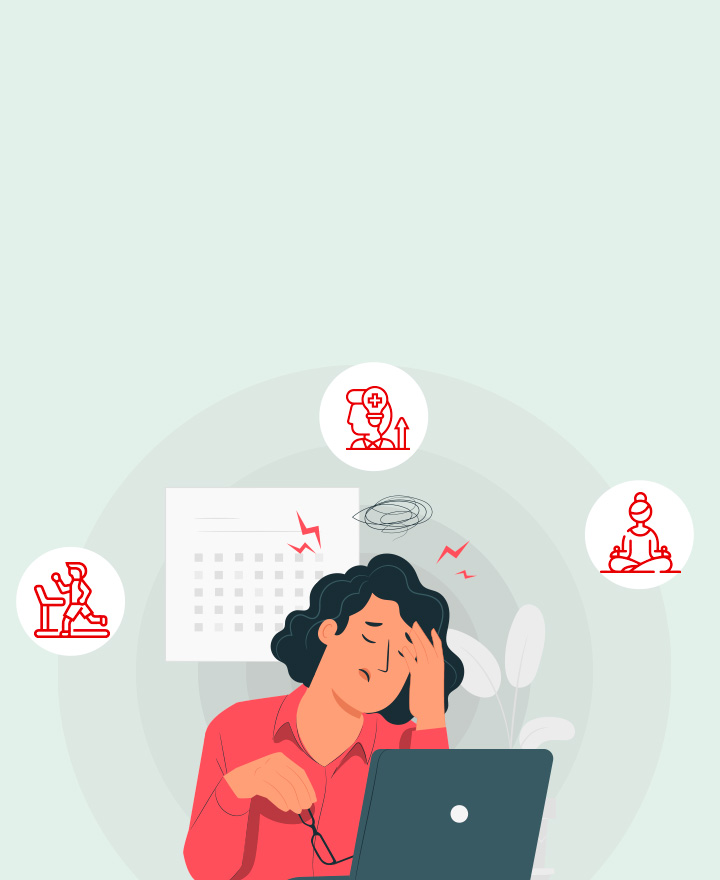

Mental Health at Work: Causes, Significance & Solutions
Mental health concerns at workplace are a worldwide reported phenomenon, affecting employee well-being, work productivity, and satisfaction. The top contributing factors to poor mental health in workplace are heavy workloads, poor work-life balance, unclear communication, limited growth opportunities, and toxic cultures. By acknowledging these issues, organisations can improve their employees’ mental health at work. Educational programs, stress management training, and confidential support services can also positively empower employees and foster a healthy work environment. Read on to understand the significance of providing mental health assistance at work and ways to establish a positive and mentally healthy workplace.
Causes of Mental Health Issues in the Workplace
Mental health problems are prevalent in almost every workplace. Stress, anxiety, burnout, and depression from work can affect the well-being, productivity, and job satisfaction of employees. These issues are intricate and interrelated, and are often caused by —
• Intense workloads and strict deadlines:
This leads to feeling overwhelmed and under constant pressure.
• Lack of work-life balance:
When work seeps into personal time, it can result in fatigue and a sense of disconnectedness.
• Poor management and lack of communication:
Micromanaging or setting unclear expectations can lead to feelings of insecurity and lack of motivation.
• Limited chances for growth and progress:
This results in employees feeling stagnant, bored, and needing more direction.
• Unhealthy work environments:
Bullying, harassment, or disrespect leads to a hostile atmosphere that significantly impacts mental well-being.
By acknowledging these factors, companies can proactively establish a work setting that prioritises mental well-being for all.
Significance of Mental Health Support
Promoting mental health at work is advantageous for both workers and employers as it results in —
• Improved employee wellness:
Workers who receive mental health support are happier, healthier, and more involved in their tasks.
• Reduced absenteeism:
Poor mental health can result in increased absences. It can also lead to an employee being physically present but mentally absent. Ensuring the mental well-being of employees helps reduce such adverse impacts on their mental well-being.
• Increased productivity and creativity:
Workers with good mental health exhibit higher productivity, creativity, and focus.
• Decreased employee turnover:
A supportive workplace can enhance employee loyalty and lower turnover expenses.
• Better employer brand image:
Companies emphasising mental well-being often attract and retain the best employees.
Mental Health Awareness Programs
Developing knowledge about mental health at work is a vital step towards addressing the issue, and it can be done by conducting —
• Educational workshops and seminars:
Arrange workshops to inform employees about mental health topics, coping methods, and accessible resources.
• Stress management training:
Offer instruction in efficient stress management methods like mindfulness exercises or time management abilities.
• Employee assistance programs (EAPs) :
Provide discreet EAPs available to mental health experts.
Stress Management Techniques
Working professionals can effectively handle stress at work by —
• Maintaining a healthy work-life balance:
Involves establishing clear boundaries between work and personal life. Avoid checking or responding to work emails and calls after work hours.
• Prioritising sleep and relaxation:
Make getting enough sleep a priority, and include relaxation practices such as deep breathing exercises or meditation in your daily schedule.
• Taking breaks and engaging in physical activity:
Break up the work day by scheduling regular breaks and engaging in physical activity. This can aid in decreasing stress levels and enhancing mood.
• Seeking support:
If you feel overloaded or have trouble managing your work, reach out to a reliable co-worker, supervisor, or therapist.
Conclusion
An inclusive collaboration between employers and employees is key to addressing the issue of mental well-being in the workplace. By making mental wellness a top priority, organisations can nurture a positive and efficient work atmosphere for all employees. If you are facing mental health challenges, reach out to a licensed professional.
One of the important components of our overall wellness is also being financially secured. Healthcare emergencies can happen any time, but a good health insurance policy can protect you from such uncertain situations. To know more about Wellness and other health related tips, visit the wellness corner.
Source: who.int, pockethrms.com, blog.mentoria.com, mind.org.uk, mentalhealthatwork.org.uk
Disclaimer: This blog provides general information and discussions about health and related subjects. The information and other content provided in this blog, website or in any linked materials are not intended and should not be considered, or used as a substitute for, medical advice, diagnosis or treatment. Kindly contact your Doctor before starting a new medicine or health regime.
Related Articles
8 Ways To Improve Your Mental Health
8 Benefits of Mental Health Counselling
How to Treat and Prevent Mental Exhaustion?
Mental Stress Can Affect Your Body – Find Out How
Early Signs of Mental Health Issues and How to Get Help
Published on September 3, 2024














 Health Insurance
Health Insurance  Travel Insurance
Travel Insurance  Car Insurance
Car Insurance  Cyber Insurance
Cyber Insurance  Critical Illness Insurance
Critical Illness Insurance
 Pet Insurance
Pet Insurance
 Bike/Two Wheeler Insurance
Bike/Two Wheeler Insurance  Home Insurance
Home Insurance  Third Party Vehicle Ins.
Third Party Vehicle Ins.  Tractor Insurance
Tractor Insurance  Goods Carrying Vehicle Ins.
Goods Carrying Vehicle Ins.  Passenger Carrying Vehicle Ins.
Passenger Carrying Vehicle Ins.  Compulsory Personal Accident Insurance
Compulsory Personal Accident Insurance  Travel Insurance
Travel Insurance  Rural
Rural